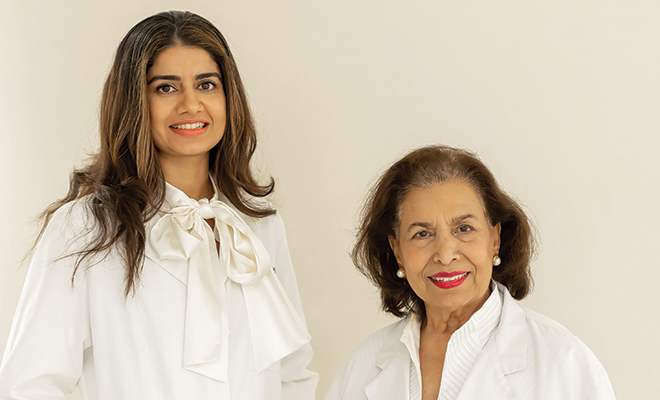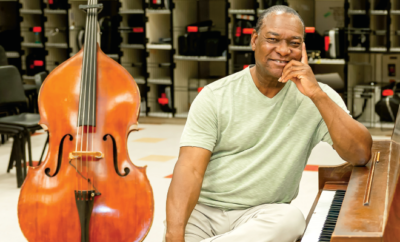 Ann Ishii
Ann Ishii
Dr. Harjit Sud and Dr. Manreet Basra: Work, Life, Balance, Family, Love
Dr. Harjit Sud
Dr. Harjit Sud has learned many life lessons in her 44 years in obstetrics and gynecology. Yet the one that stands out most is that the best medicine doesn’t come from prescriptions, but rather from the relationships that have been formed between patient and physician. As one of the first female gynecologists and obstetricians in the San Joaquin Valley, having worked full time for 42 of those years, she is an example that quality patient care is the most important and non-negotiable. Now nearing retirement, Dr. Sud reflects on her years.
Her Inspiration for Pursuing Education
Dr. Sud admitted her love for medicine stems from supportive individuals who encouraged her at an early age. Growing up in India, her first encounter came from her fifth-grade teacher. “She wrote on my paper, ‘Good job, keep up the good work,’ and that stuck with me.” It was the motivation she needed to push herself in schooling. These inspiring words, along with the support from her parents, would eventually motivate her to become not only the top in her graduating class from B.J. Medical School, Ahmedabad, India, but also the top ranked in the state of Gujarat, India.
Working with women and attending to their needs led her into the field of gynecology. While she had ranked at the top in her class in general surgery, she moved toward obstetrics and gynecology. “It just seemed such a natural way to go. It wasn’t a struggle to make a decision,” she recalled. She continued her residency in Chicago, Illinois, at Michael Reese Hospital and Medical Center. There she met and eventually married her husband and future doctor, Dr. Thomas Streeter, who was also completing his residency in obstetrics and gynecology. After residency they settled in Stockton, California, to be close to his family in the Sacramento area.
What’s Essential to Her Practice
Dr. Sud recognizes that having a team is an indispensable part of being an excellent physician and she’s the first to give credit where credit is due. “Having an assistant, a nurse or a medical assistant with heart, one who cares for the patients and loves her job, is a gift for the busy physician,” she said. Dr. Sud recalled one such medical assistant who holds a special place in her heart. “Her name was Abigail, lovingly called Abbie. Every patient adored her. She had an insatiable desire to educate herself.” Sadly, Abbie passed in 2020 to COVID. “I miss her every day. I had the good fortune to have her exclusively as my assistant for 34 years,” Dr. Sud mused.
Today’s Physicians
Dr. Sud admires the new generation of physicians. “They have a better understanding of work, life and balance,” said Dr. Sud, referring to younger physicians with new families. She recalled that in her early years, many doctors didn’t manage the balance of work time and home time. “It was expected to commit your life primarily to medicine, obstetrics particularly. You’re expected to drop everything at a moment’s notice.
“Younger physicians consider their lives outside of medicine and I believe this will help their career longevity. Based on what I’ve experienced in my life, I think it’s important to make time for family.” In 1987, when her youngest child was four, she continued to work full time but made the difficult decision to focus only on gynecology and less on obstetrics so she could prioritize her family. “Doing this made me a better doctor and mom,” she affirmed. “If you want to have a lifelong happy career, you need to balance that family time. You have to have that joy in life. Patients see that this is a happy doctor, and she loves what she’s doing.”
Blessings in Her Practice
Being a doctor is about caring deeply about people. “I enjoy taking care of my patients,” she stated. While Dr. Sud has helped thousands of women over the years, she considers herself the lucky one. “In gynecology there’s enough time to talk and get to know my patients. They tell you about their families and their children. It’s a privilege to have that position in someone’s life that they trust you, bare their soul, that they share their most inner life with you in that examining room. I have enjoyed every day being in practice.” And patients recognize her dedication. “Patients have many ways they want to thank their doctor, with flowers, homemade pastries, box of chocolates. My favorite was when I walked into an examining room with an apology on my lips after the patient had been waiting over 30 minutes. She smiled and said, ‘No worries, Dr Sud, you are worth waiting for.’”
Thoughts about Retirement
In 2020, Dr. Sud lightened her workload and now practices part time. Committed to her philosophy of balancing personal and work time, she is a devoted grandmother of four, but has no plans of letting go of her practice if she can help it. “I will continue to work as long as my health permits me,” she said. Still, she makes room for other loves such as her book club and coffee dates with friends.
Dr. Sud has wise advice for the new generation of physicians. “Always practice with integrity and honesty; your patients deserve your respect in addition to your expertise. Remember, every patient is a VIP patient. Being able to practice medicine could be one of the biggest privileges of your life.”
Dr. Manreet Basra
As one of the few women cardiologists in the San Joaquin Valley, Dr. Manreet Basra has brought a great amount of compassion to the valley. Proudly calling Stockton her home, she talked candidly about her love of her community and family, her hope for other young professionals and the role models who inspired her along the way.
Her Inspiration to Pursue Cardiology
Originally from Punjab, India, she admitted medicine was not her first passion but rather fashion design, yet she was inspired by her mother, who is a doctor currently practicing gynecology in India. After completing medical school, she wasn’t sure what area of study she would practice until she started her residency in Buffalo, New York, where another cardiologist served as her mentor. “Dr. Sue Graham, my attending, was one of the few women cardiologists at the time. I was always inspired by my mother, but Dr. Graham brought the social side to cardiology,” she stated. “We would be in a cardiac ICU wing with very sick and dying patients. After we did the rounds, she would say, ‘Okay, you did the medicine part, now where’s the family part?’” Dr. Basra recognized through Dr. Graham’s guidance that medicine wasn’t just about the science but also about recognizing the humanity behind the patient. “Treating patients in cardiology, you come the closest to life and death. She gave me a different aspect of getting the gratification of practicing cardiology, making a difference in a person’s life, but still to be human.”
Managing Family and Work
“Stockton is home; the medical community is very close knit,” Dr. Basra affirmed. In 2015, she and her husband, Dr. Gurtej Malhi, a gastroenterologist, moved to Stockton, where he first set up his practice. At the time, she was a new mother. She soon joined Pacific Heart and Vascular Medical Group; she has been with the group ever since. Dr. Basra acknowledged that she and her husband work together to balance family and work time. Sons Waaris, 7, and Nishaan, 6, love their Brookside community and Dr. Basra admits they have been a great support system.” I love my neighborhood. The schools here are great. My children attend Brookside Elementary, and I love the atmosphere.” She also believes her position as a physician serves as a great example to her children. “An educated woman raises her children to be educated,” she stated.
Admiration for Women Doctors
As a physician who specializes in cardiology for women’s issues, Dr. Basra recognizes all doctors, men or women, offer their own unique personalities, but she admitted that there’s a specialness female doctors bring to their patients. “As a woman, there’s a certain level of empathy.” She also recognizes that in her field she serves as a role model for young women. “We have a lot to give to the community,” she said, especially as the ratio of women physicians to male physicians has come close to 50 percent in more recent years. In cardiology, that number is closer to only 15 percent, but it has increased more so than in years past. Like women who inspired her to be a cardiologist, Dr. Basra hopes to do the same. “I would like to be able to inspire other women, high school, college or residents, to be able to see that cardiology will make a difference in other people’s lives,” she commented.
Support from San Joaquin Colleagues
Dr. Basra is a member of the San Joaquin Medical Society, and she believes the support she received when she first arrived in Stockton was invaluable. “I appreciated that the doctors in my group treated me as an equal, right from the beginning. I have good people to work with. It’s also important to be a support system for other physicians,” she stated.
“We must be able to uplift the medical community, make ourselves useful for the community, and be able to be there for our peers when they need us. My goal is to stay and serve this community and make some positive changes as time goes on.”
The Lesson, The Advice
Dr. Basra points out that being in medicine is about treating the human condition, not the accolades or career successes. “It’s the only profession in the world where money comes below humanity. If someone doesn’t have money, you don’t care; you just treat them,” she asserted. She shared that the pandemic opened her eyes and reaffirmed her role to put patients first and make sacrifices.
“These last two years have been a perfect example of that. We didn’t care what would become of us.”
Dr. Basra stated emphatically her words of wisdom for future physicians. “For those who want to go into medicine, you should do it with all your heart. Don’t think it’s not doable. There are times when things get very tough, especially when you get to the point of making life and death decisions, but I think that’s why you were given a chance by God to be in this position. It’s all worth it in the end. All human life is precious and every person who comes into my examining room is treated equally.”










